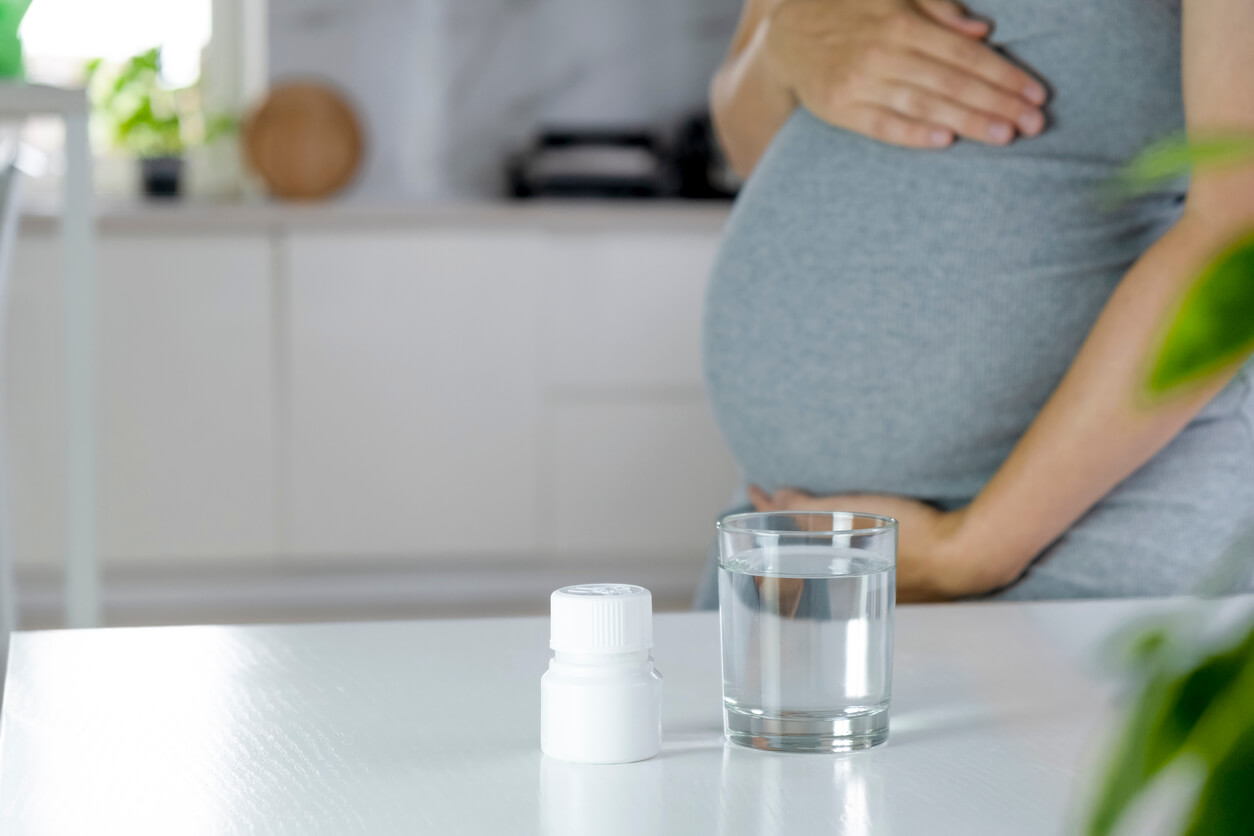Is It Safe to Eat Surimi During Pregnancy?


Written and verified by the nutritionist Saúl Sánchez Arias
Surimi is a food that’s prepared from fish protein that aims to emulate seafood. It’s perfect for adding to salads and cold dishes, as it improves their flavor and texture. However, we’re going to tell you whether or not it’s safe to consume surimi during pregnancy.
It should be taken into account that, during pregnancy, it’s crucial to be more careful than ever with the diet. Some foods are restricted at this time because they present a microbiological risk. In addition, any intoxication could endanger the health of the fetus.
The elaboration of surimi
First, we’ll take a moment to go into more detail about what this food known as surimi consists of. It’s a product that originated in Japan and is made from fish fillets. In any case, it doesn’t contain in its interior the remains of sea products, as it was once claimed.
In addition, before being packaged and sold to the public, it undergoes a pasteurization process. This process ensures the destruction of all pathogenic microorganisms that may exist inside, which guarantees quality from a hygienic point of view.

Surimi properties
First of all, we’d like to tell you about the main nutritional properties of surimi. We’ll detail them below.
Promotes digestion
We’re talking about a product that has proteins of high biological value, i.e., it contains all the essential amino acids and has a good score in terms of digestibility. These nutrients are essential for maintaining healthy muscle mass, according to a study published in the journal Nutrients.
Improves cardiovascular health
Surimi contains omega-3 fatty acids. These elements are essential for maintaining good cardiovascular health. Also, they positively affect the development of the child’s nervous system during the first stages of life, as stated in a study published in the journal Critical Reviews in Food Science and Nutrition.
Prevents the development of anemia
This food contains vitamin B12, which is a nutrient exclusive to foods of animal origin that protects against the development of anemia. It’s important to highlight that this disease during pregnancy can have a negative impact on the well-being and development of the fetus. In fact, supplementation with this vitamin is often recommended, especially in the context of vegan diets.

Surimi can be consumed during pregnancy
Despite being a product that’s included among ultra-processed industrial products, it’s possible to consume surimi in moderation during pregnancy. In any case, it shouldn’t be abused, as it contains additives inside. However, occasional intake won’t be harmful and will contribute to reaching the necessary nutritional requirements.
It’s important to highlight that this product doesn’t pose any microbiological risk, as only fish proteins are used for its conformation. For this reason, it’s considered safe, even if it’s not cooked before consumption. It can even be included in the diet during almost all stages of life without generating major problems.
Surimi: A product that’s suitable during pregnancy
As we’ve mentioned, surimi is a product suitable to be introduced into the diet of pregnant women without any risk. It undergoes a series of pasteurization processes that ensure its quality from a hygienic point of view. This ensures that there are no pathogenic microorganisms inside that could harm the woman or the fetus.
In addition, it’s a fairly dense food from a nutritional point of view. It provides proteins of high biological value and quality fatty acids that contribute to guaranteeing the correct development of the fetus. It’s also a source of vitamin B12, which is a nutrient deficient in a large part of restrictive diets.
However, when choosing surimi, we recommend that you opt for one that doesn’t contain additives inside. To do so, you should check the labeling and the list of ingredients.
Surimi is a food that’s prepared from fish protein that aims to emulate seafood. It’s perfect for adding to salads and cold dishes, as it improves their flavor and texture. However, we’re going to tell you whether or not it’s safe to consume surimi during pregnancy.
It should be taken into account that, during pregnancy, it’s crucial to be more careful than ever with the diet. Some foods are restricted at this time because they present a microbiological risk. In addition, any intoxication could endanger the health of the fetus.
The elaboration of surimi
First, we’ll take a moment to go into more detail about what this food known as surimi consists of. It’s a product that originated in Japan and is made from fish fillets. In any case, it doesn’t contain in its interior the remains of sea products, as it was once claimed.
In addition, before being packaged and sold to the public, it undergoes a pasteurization process. This process ensures the destruction of all pathogenic microorganisms that may exist inside, which guarantees quality from a hygienic point of view.

Surimi properties
First of all, we’d like to tell you about the main nutritional properties of surimi. We’ll detail them below.
Promotes digestion
We’re talking about a product that has proteins of high biological value, i.e., it contains all the essential amino acids and has a good score in terms of digestibility. These nutrients are essential for maintaining healthy muscle mass, according to a study published in the journal Nutrients.
Improves cardiovascular health
Surimi contains omega-3 fatty acids. These elements are essential for maintaining good cardiovascular health. Also, they positively affect the development of the child’s nervous system during the first stages of life, as stated in a study published in the journal Critical Reviews in Food Science and Nutrition.
Prevents the development of anemia
This food contains vitamin B12, which is a nutrient exclusive to foods of animal origin that protects against the development of anemia. It’s important to highlight that this disease during pregnancy can have a negative impact on the well-being and development of the fetus. In fact, supplementation with this vitamin is often recommended, especially in the context of vegan diets.

Surimi can be consumed during pregnancy
Despite being a product that’s included among ultra-processed industrial products, it’s possible to consume surimi in moderation during pregnancy. In any case, it shouldn’t be abused, as it contains additives inside. However, occasional intake won’t be harmful and will contribute to reaching the necessary nutritional requirements.
It’s important to highlight that this product doesn’t pose any microbiological risk, as only fish proteins are used for its conformation. For this reason, it’s considered safe, even if it’s not cooked before consumption. It can even be included in the diet during almost all stages of life without generating major problems.
Surimi: A product that’s suitable during pregnancy
As we’ve mentioned, surimi is a product suitable to be introduced into the diet of pregnant women without any risk. It undergoes a series of pasteurization processes that ensure its quality from a hygienic point of view. This ensures that there are no pathogenic microorganisms inside that could harm the woman or the fetus.
In addition, it’s a fairly dense food from a nutritional point of view. It provides proteins of high biological value and quality fatty acids that contribute to guaranteeing the correct development of the fetus. It’s also a source of vitamin B12, which is a nutrient deficient in a large part of restrictive diets.
However, when choosing surimi, we recommend that you opt for one that doesn’t contain additives inside. To do so, you should check the labeling and the list of ingredients.
All cited sources were thoroughly reviewed by our team to ensure their quality, reliability, currency, and validity. The bibliography of this article was considered reliable and of academic or scientific accuracy.
- Berrazaga, I., Micard, V., Gueugneau, M., & Walrand, S. (2019). The Role of the Anabolic Properties of Plant- versus Animal-Based Protein Sources in Supporting Muscle Mass Maintenance: A Critical Review. Nutrients, 11(8), 1825. https://doi.org/10.3390/nu11081825
- Martins, B. P., Bandarra, N. M., & Figueiredo-Braga, M. (2020). The role of marine omega-3 in human neurodevelopment, including Autism Spectrum Disorders and Attention-Deficit/Hyperactivity Disorder – a review. Critical reviews in food science and nutrition, 60(9), 1431–1446. https://doi.org/10.1080/10408398.2019.1573800
This text is provided for informational purposes only and does not replace consultation with a professional. If in doubt, consult your specialist.








